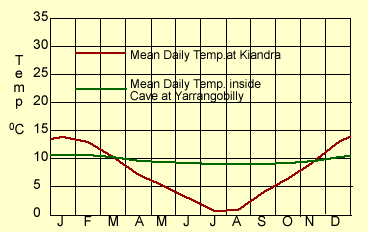3a. Climate


Kiandra is only a few kilometers from the Yarrangobilly area and is the closest location with climatic data recorded. The temperature graph shows the difference between the outside temperature and that deep within the caves. Being inside a cave is a bit like being inside an insulated box such as an Esky. The surrounding rock insulates the cave from temperature changes, both diurnal (daily) and seasonal. The temperature inside a cave is very close to the average annual temperature outside the cave. Compare the daily and seasonal temperature variations for Kiandra to that inside the caves.
When compared to outside climatic elements, caves have:
- high humidity
- cool temperatures in summer and are warmer in winter
- high carbon dioxide levels
- no light
- no rain
- no strong winds
- very little seasonal or diurnal changes
Cave climates vary as you go further into them. They can be broadly divided into three zones, entrance, twilight and dark. The next three pages show readings typical for the Yarrangobilly Caves in summer
| cave entrance |